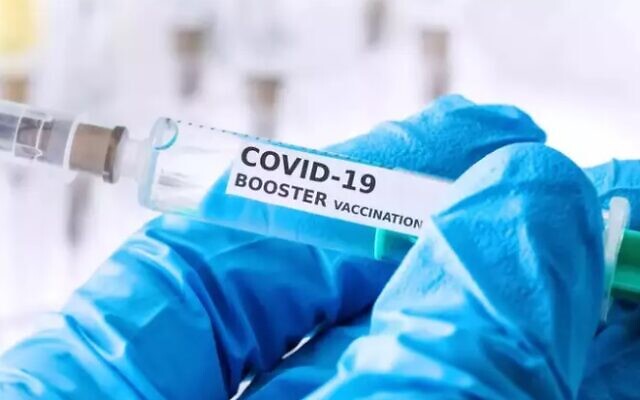COVID-19 Booster Shots Are Already Available
Even those not immunocompromised are rolling up their sleeves.

Any day now, the Centers for Disease Control and Prevention (CDC) will issue guidelines detailing who should get a COVID-19 booster shot and when. Until that time, it’s like the wild, wild West with everyone shooting from the hip in nearly every direction.
Amid surging numbers of infections, hospitalizations and deaths — mostly among those who are unvaccinated — as well as continued sparring between some politicians and medical professionals about vaccinations, face masks and social distancing, the Federal Drug Administration finally gave full approval to the Pfizer-BioNTech COVID-19 vaccine on Aug. 23. The FDA has promised full authorization for the Moderna COVID-19 vaccine by the end of August. Both vaccines had previously only been approved on an emergency-use basis.
Dr. Harry J. Heiman, clinical associate professor in the Department of Health Policy and Behavioral Sciences at Georgia State University’s School of Public Health, said that the Advisory Committee on Immunization Practices at the CDC has already recommended a third shot — often called a booster — for those who have received either the first two Pfizer or Moderna vaccines.
Speaking just days before the FDA gave full approval to the Pfizer vaccine, Heiman anticipated that it would grant approval to the booster soon afterwards.
U.S. Surgeon General Vivek Murthy announced that Americans who had received the first two vaccines would be eligible to receive the booster shots eight months after receiving their second doses, beginning Sept. 20.
At the same time, though, the CDC recommended that moderately to severely immunocompromised people not wait until that plan launches in late September, as long as the booster shot is administered at least four weeks after the second dose of either the Pfizer or Moderna vaccines. The CDC considers people immunocompromised if they have:
- Been receiving active cancer treatment for tumors or cancers of the blood.
Received an organ transplant and are taking medicine to suppress the immune system. - Received a stem cell transplant within the last 2 years or are taking medicine to suppress the immune system.
- Moderate or severe primary immunodeficiency (such as DiGeorge syndrome, Wiskott-Aldrich syndrome).
- Advanced or untreated HIV infection.
- Active treatment with high-dose corticosteroids or other drugs that may suppress immune response.

Heiman added that immunocompromised patients are not required to present any documentation to receive the booster shot.
According to the CDC, there’s still not enough data to determine whether immunocompromised patients who received the Johnson & Johnson vaccine will also have an improved antibody response following a booster of its one-time shot.
Heiman acknowledged that currently “there are more questions than answers” about the booster vaccines. What is known is that people should receive the same vaccine – either Pfizer or Moderna – for their boosters as they did for the first two doses. Based on data from countries – including Israel – that started their booster programs before the U.S. did, reactions have been similar to the two-dose series, including fatigue and pain at the injection site.
The U.S. is basing its decisions not only on Israel, which Heiman said is a “critical test case because it has more active surveillance. The U.S. is also looking at who is being hospitalized or dying in this country and elsewhere.”
Although the first two doses are considered effective for fighting COVID-19 infections, data indicates a waning of effectiveness over time, especially because of new variants like the highly contagious Delta variant. Research indicates that booster shots boost efficiency against severe illness from the virus to 97 percent anywhere from 10 to 16 days following immunization.
The Biden Administration said its rollout plan for booster shots would follow the original immunization plan, starting first with those in nursing homes, front-line healthcare workers and the elderly.
But Heiman said people are already playing the system, meaning that even those who are not immunocompromised are standing in line and rolling up their sleeves for the booster. Every pharmacy appears to have its own guidelines, often with no requirement of proof, while doctors are reporting that they are still awaiting CDC guidelines.
JHL Medical Services, which is part of Jewish HomeLife’s network of at-home caregivers and residential communities, said it is “following CDC recommendations with regard to boosters.”
“We are setting up clinics in our communities for residents, families and team members who meet the criteria,” said Shari Bayer, chief marketing and communications officer for Jewish HomeLife.
“Our public clinic is open Wednesday and Friday afternoons for first and second shots, and also for the third shot for those who meet the CDC’s recommended criteria,” she added, noting that it is offering the Moderna vaccine. Walk-ins are welcome, but appointments are preferred.
Heiman said he’s been particularly impressed with several Jewish organizations as far as vaccines are concerned, noting that staff at the Jewish Federation of Greater Atlanta and the Jewish Family & Career Services are “essentially 100 percent vaccinated.”
But Heiman emphasized that, even among the vaccinated, people should avoid high-risk crowded settings. Indoors, he said, people should wear masks. And he warns that the timing of the High Holy Days this year “is looking dramatically worse than last year” as far as the spread of COVID-19 is concerned.
- News
- Jan Jaben-Eilon
- Centers for Disease Control and Prevention
- Dr. Harry J. Heiman
- COVID-19
- booster
- Pfizer-BioNTech vaccine
- Federal Drug Administration
- Moderna vaccine
- COVID-19 vaccine
- Department of Health Policy and Behavioral Sciences at Georgia State University’s School of Public Health
- Advisory Committee on Immunization Practices
- Vivek Murthy
- Israel
- Delta variant
- Biden administration
- JHL Medical Services
- Jewish HomeLife
- Shari Bayer
- jewish federation of greater atlanta
- Jewish Family & Career Services
- High Holy Days
- Local



comments